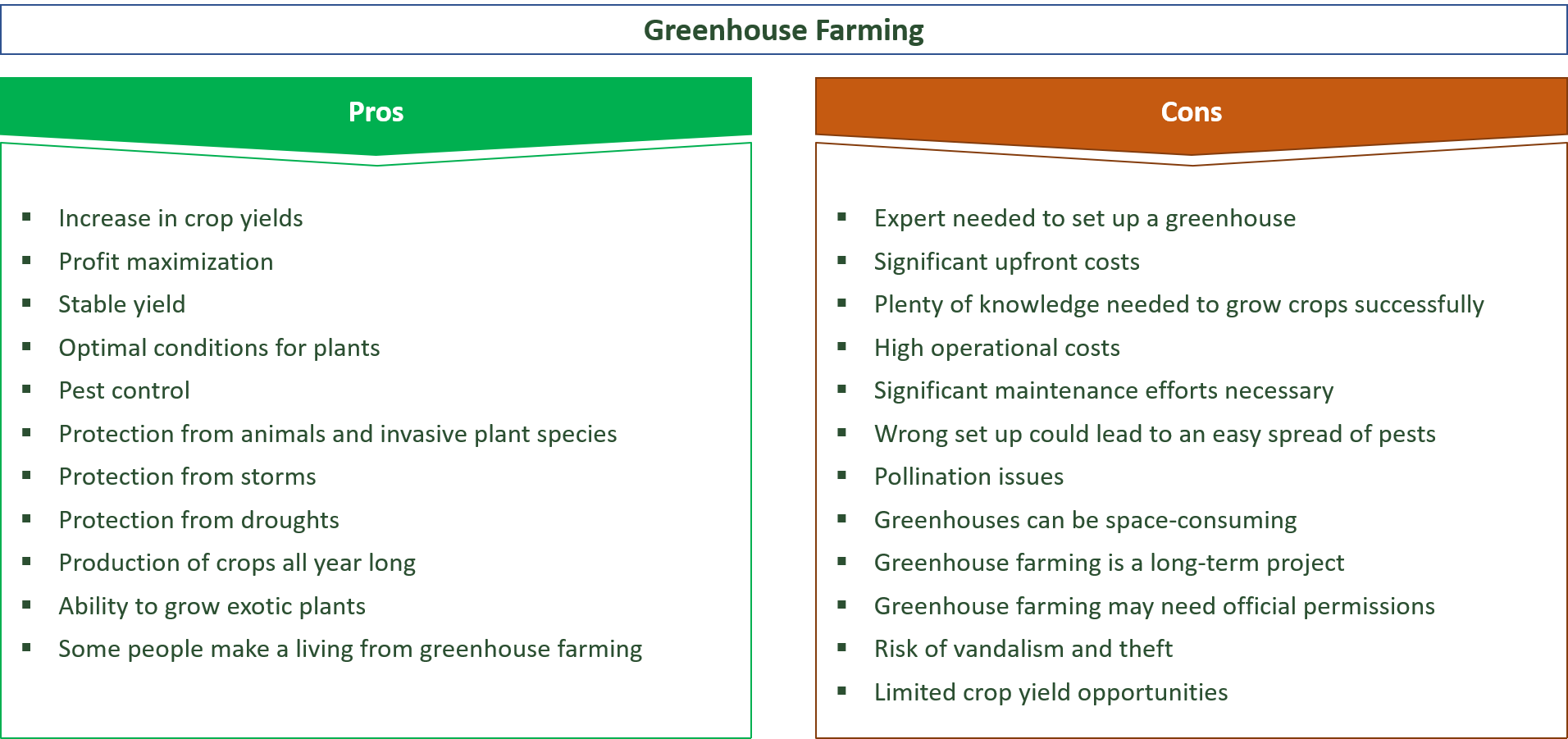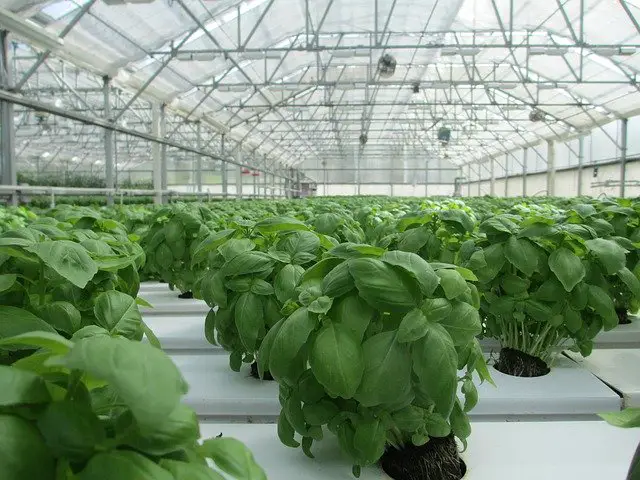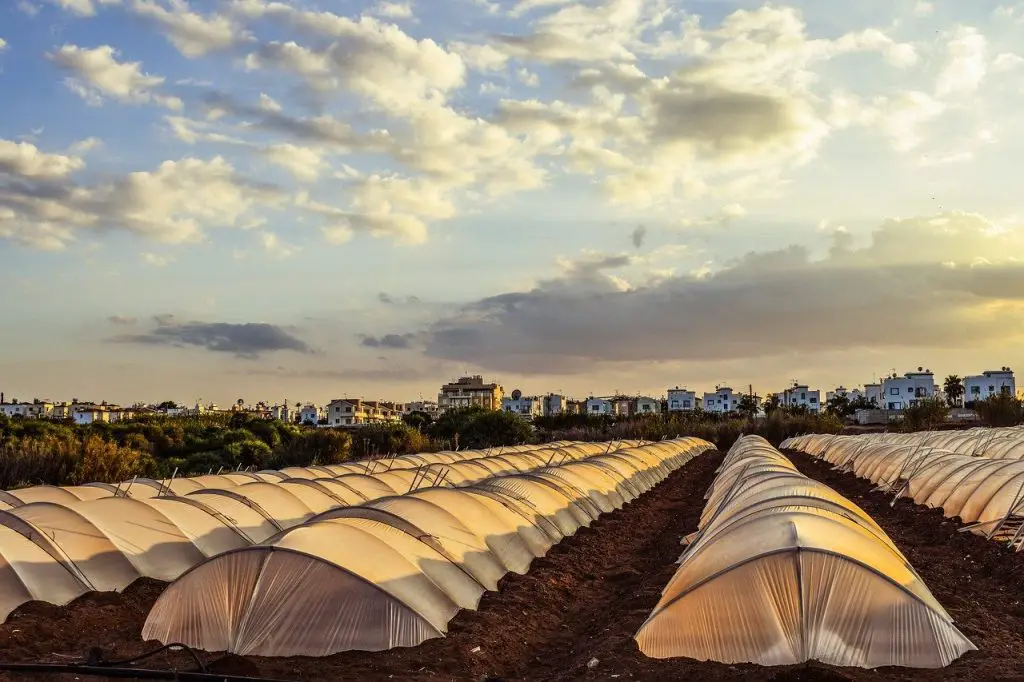” Farming looks mighty easy when your plow is a pencil and you’re a thousand miles from the corn field.”
Dwight D. Eisenhower, Politician
Pros and Cons of Greenhouse Farming

Greenhouse farming can be an efficient way to plant and harvest plenty of fruits and vegetables all year long.
This could increase the variety of food supply and may benefit many people worldwide.
However, greenhouse farming not only has advantages, but may also imply serious downsides.
In this article, the pros and cons of greenhouse farming are examined.
Audio Lesson
Contents
Advantages of Greenhouses
- Increase in crop yields
- Profit maximization
- Stable yield
- Optimal conditions for plants
- Pest control
- Protection from animals and invasive plant species
- Protection from storms
- Protection from droughts
- Production of crops all year long
- Ability to grow exotic plants
- Some people make a living from greenhouse farming
Increase in crop yields
One important upside of greenhouses for gardening is that it is possible to significantly increase crop yields.
Compared to outdoor farming, the plants can grow in a protected environment and the conditions regarding humidity and heat can be optimized.
Therefore, the plants will grow faster on average and will also produce higher crop yields on average.
Profit maximization
Since crop yields can be increased due to the use of greenhouses, also profits can be maximized.
The more crops are produced by farmers, the more money they make.
Of course, this is a quite simplified argumentation and reality may be much more complicated since also costs may be higher in greenhouses compared to outdoor farming.
However, many greenhouse farmers earn still pretty good money since they can optimize their output and therefore also their profits.
Stable yield
Another advantage of greenhouse farming is that the yield is quite stable all year long.
Compared to outdoor farming where the whole yield could be destroyed due to extreme climatic conditions, plants are properly protected in greenhouses.
Thus, it is highly unlikely that there are big swings in crop yields when a greenhouse is used.
This guarantees the farmer to have a stable income and also facilitates long-term contracts with grocery stores since they can rely on stable food supply from greenhouse farmers.
Optimal conditions for plants
In general, the conditions for plants can be optimized in greenhouses, which has a positive impact on the growth behavior as well as on the yields.
For instance, let’s assume that we want to grow a tomato plant.
We can grow it either outdoor or in a greenhouse. If we plant the tomato outdoor on a field, the tomato will be vulnerable to all kinds of natural factors.
If we plant the tomato plant in a greenhouse, we can make sure that it gets the right amount of water, heat and lighting every day.
It is pretty clear that the tomato in the greenhouse will grow faster and the yields will be higher since conditions can be optimized compared to just growing the tomato plant on an outdoor field.
Pest control
When it comes to growing plants, it is crucial to control pests since they can have an adverse impact on the growth behavior as well as on the yield.
In the worst case, plants can even die if the pest infestation is too strong.
It is quite hard to do proper pest control outdoor on a field since the field is exposed to the natural environment 24/7 and pests can spread easily across plants.
Even with the use of pesticides, a fraction of the yield will still be lost due to pests.
By growing plants in greenhouses instead, pest control is much easier since a greenhouse is a closed system and not too many pests can enter the greenhouse.
Even if there were pests inside, a single treatment with pesticides should be enough to get rid of the pests.
Thus, pest control is generally much easier in greenhouses compared to outside farming.
Protection from animals and invasive plant species
Growing plants in greenhouses also has the advantage that plants are protected from animals and also from invasive plant species.
Thus, these plants can grow in an optimal manner since they are not at risk of being eaten by animals.
Also their natural living conditions are not altered through invasive species which may compete against them and take away space, sunlight and nutrients from them.
Therefore, plants that are raised in greenhouses are typically less vulnerable to outside factors and the yields will likely be higher due to that.
Protection from storms
Storms are a big cause for the destruction of crop yields on a global scale.
Through the use of stable greenhouses, the negative effects of storms on crop yields could be significantly lowered since as long as greenhouses are able to withstand the storm, the plants inside will not suffer at all.
Therefore, assuming that greenhouses are constructed in a stable manner, they could vastly reduce the losses in yields due to storms.
Protection from droughts
Droughts are also a big problem for farmers who grow their plants outside on their fields.
Especially in the Southern hemisphere of our planet, farmers are pretty helpless against droughts since they will simply often not have enough water or also no suitable irrigation systems.
This problem will become even worse due to global warming in the near future.
By using greenhouses instead, farmers are able to use their water reserves much more efficiently since less water will evaporate and farmers could better protect against droughts, which might be essential in the long run to ensure their livelihood.
Production of crops all year long
Through the use of greenhouses, it is also possible to grow vegetables, fruits and other plants all year long.
This not only increases the production capacities, but also ensures a bigger variety of veggies and fruits for the local population.
Thus, especially in poor countries of our world, being able to grow plants all year long may supply food to many people who would otherwise have to suffer from serious hunger.
Ability to grow exotic plants
Since the conditions in greenhouses can be optimized for all kinds of different plants, it is possible to grow all sorts of exotic plants that would never survive when planted outside on the fields.
Thus, greenhouses give farmers the opportunity to switch from conventional local plants to more exotic versions if they like to do so.
Some people make a living from greenhouse farming
For some people who are quite passionate about it, greenhouse farming can be a serious business and some people could make a living out of it.
However, greenhouse farming is not only suitable as a business opportunity, but it can also be fun to grow your own vegetables and fruits on a smaller scale.
It depends on your preference whether you want to invest plenty of time and money in it or if you just want to make greenhouse farming one of your hobbies.

Disadvantages of Greenhouse Farming
- Expert needed to set up a greenhouse
- Significant upfront costs
- Plenty of knowledge needed to grow crops successfully
- High operational costs
- Significant maintenance efforts necessary
- Wrong set up could lead to an easy spread of pests
- Pollination issues
- Greenhouses can be space-consuming
- Greenhouse farming is a long-term project
- Greenhouse farming may need official permissions
- Risk of vandalism and theft
- Limited crop yield opportunities
Expert needed to set up a greenhouse
In most cases, especially when it comes to big greenhouses, you will need help from an expert who sets up your greenhouse properly.
This includes the construction, but also the optimization of parameters regarding humidity, temperature and lighting inside the greenhouse.
It may sometimes be hard to find specialists in this field, especially if you want to turn greenhouse farming into a serious full-time business.
Significant upfront costs
You should also get quotes regarding the installation and maintenance costs of greenhouses.
Depending on the size and the plants you want to grow, the upfront costs as well as the maintenance costs can be quite high.
After getting the quotes, you will be better able to conclude whether getting a greenhouse will be a viable option for you or not.
Plenty of knowledge needed to grow crops successfully
Even though many people think that growing plants is quite easy, the opposite is true.
There are so many factors when it comes to growing plants in an optimal manner and only one mistake can lead to the spread of pests or to significantly lower crop yields.
Thus, plenty of knowledge regarding farming is needed in order to make your greenhouse business successful.
Sure, if you just want to have a small greenhouse for fun, you can make more mistakes and learn from them.
However, if you consider your greenhouse to be your main source of income, you should ask yourself whether your knowledge will be sufficient in order to avoid unpleasant financial consequences in the future.
High operational costs
The operation of greenhouses also implies significant costs for electricity and heating.
This makes greenhouse farming often more expensive compared to traditional outside farming on fields.
Thus, especially in countries where the costs for heating and electricity are quite high, it might be better to rely on outdoor farming from a financial perspective instead.
Significant maintenance efforts necessary
Also the maintenance efforts and costs related to greenhouses are significant.
Since the inside conditions of greenhouses have to be stable over time, plenty of monitoring has to be done.
Moreover, if the heating or lighting system inside the greenhouse collapses, it needs to be fixed quite soon since the plants would suffer pretty soon otherwise.
Thus, maintaining the optimal conditions in greenhouses can be a time-consuming task and may also be quite expensive over time.
Wrong set up could lead to an easy spread of pests
The yields of plants that are grown inside greenhouses are only higher compared to outdoor farming if the conditions inside the greenhouses are optimized.
However, if the set up of greenhouses had been done in an incorrect manner, chances are that the yields will suffer and plants may even die off if conditions inside the greenhouse are bad enough.
Thus, it is crucial to make sure that an expert sets up the greenhouse in order to avoid negative consequences in the long run.
Pollination issues
Another issue related to greenhouses is that the pollination of plants takes more effort compared to outdoor farming.
When farming outdoor on a field, insects like bees pollinate the crops and the farmers often do not have to make any efforts regarding pollination at all.
However, since greenhouses are closed systems and no insects will be around, the farmers have to manually pollinate the plants in order to ensure their crop yields.
Greenhouses can be space-consuming
Depending on the purpose of the greenhouse and whether you want to use it for commercial purposes or not, you may need large areas of land to set them up.
Commercial farmers often use pretty big greenhouses in order to make their greenhouse farming business as profitable as possible.
Thus, keep in mind that you would need to buy or rent large areas of land to engage in greenhouse farming as a serious business.
However, if you just want to grow your plants for fun, you can also use a small greenhouse and just put it in your backyard.
Greenhouse farming is a long-term project
If you want to engage in greenhouse farming as a serious business, you should know that it should be a long-term business since the initial investment costs are pretty high and you will also have to put in plenty of work.
Thus, make sure that growing plants is your passion and that you calculate everything before engaging in this kind of business in order to avoid adverse financial consequences.
Greenhouse farming may need official permissions
In some regions, you might also need permission in order to engage in greenhouse farming.
This is especially true when it comes to making a living out of it.
Thus, make sure that you will get permission or if there are any special requirements before choosing to engage in the greenhouse farming business in order to avoid penalties.
Moreover, clarify how taxes have to be declared properly for greenhouse farming in your area in order to avoid fines for tax fraud.
Risk of vandalism and theft
As the owner of a big greenhouse, you are also at risk of vandalism or theft.
Some people just want to destroy things and might just throw stones at your greenhouse.
This might lead to serious damage.
If you are not insured against those kinds of attacks, chances are that you might suffer from serious costs regarding necessary repairs.
Thus, you should make sure to get proper insurance for your greenhouse if you consider it to be a serious business.
Limited crop yield opportunities
Compared to outdoor farming, there is usually less space in greenhouses and the overall output capacities will be lower.
Thus, especially in regions where the local population needs large amounts of food to survive, outdoor farming may be a better way to ensure the vegetable and fruit supply of locals.

Top 10 Greenhouse Pros & Cons – Summary List
| Greenhouse Farming Pros | Greenhouse Farming Cons |
|---|---|
| Increase in yields | Expert needed in the setup process |
| Optimal conditions for plants | Growing plants is not easy |
| Protection against wind | Significant maintenance costs |
| Protection against droughts | Pollination problems |
| Pest control | Greenhouses can be space-consuming |
| Ability to plant exotic plants | May need official permission |
| Job opportunity | Risk of vandalism |
| Increase in profits | High operational costs |
| Crop harvest all year long | High upfront costs |
| Protection from animals | Limited capacities |
Conclusion
Greenhouse farming has many advantages and might be a suitable alternative to conventional outdoor farming.
However, there are also some issues related to greenhouse farming.
Whether greenhouse farming should be preferred over outdoor farming depends on individual preference and also on climatic and geographical factors.
Thus, if you consider engaging in greenhouse farming, make sure to evaluate all pros and cons properly in order to make a profound business decision.
Sources
https://en.wikipedia.org/wiki/Greenhouse
http://ecoursesonline.iasri.res.in/mod/page/view.php?id=1604
https://www.growingreenhouse.com/greenhouse-structure/

About the author
My name is Andreas and my mission is to educate people of all ages about our environmental problems and how everyone can make a contribution to mitigate these issues.
As I went to university and got my Master’s degree in Economics, I did plenty of research in the field of Development Economics.
After finishing university, I traveled around the world. From this time on, I wanted to make a contribution to ensure a livable future for the next generations in every part of our beautiful planet.
Wanna make a contribution to save our environment? Share it!